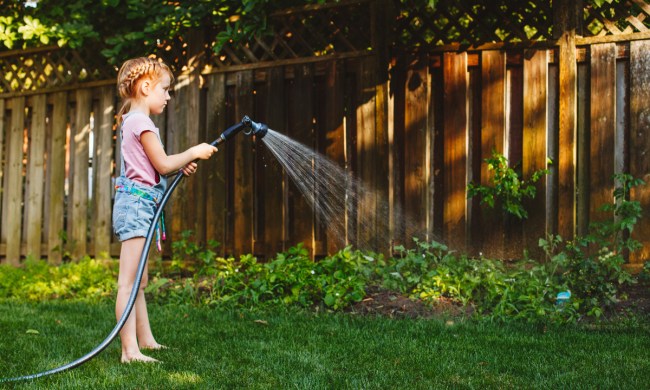
We are living in an online world, and like it or not, children on the internet is unavoidable –kids are going online at an increasingly younger age. Whether it’s giving a toddler a smartphone to keep them occupied or an elementary student using the family computer for schoolwork, kids are being exposed to the internet at a young age. Kids can even talk to Santa online now. Tech-savvy kids can often surf the net better than their parents.
According to HighSpeedInternet.com, kids as young as 3 are hopping online. Other parents wait until their children reach elementary school and the research projects start before introducing their kids to the wonders of the internet. With kids getting their own tablets and smartphones younger and younger, when is the best age to let your kids go online?
Start young

Experts recommend allowing your child internet access at a young age – with rules and using parental controls – so they learn how to navigate online and recognize when they come across content that is inappropriate. Emily Rothman, Ph.D., a community health scientist at the Boston University School of Public Health, explained to the NYT that parents need to be talking to their children about some of the inappropriate content they may see online as young as kindergarten.
“Conversations about pornography can and should start really early,” she said, noting it’s important that parents assure their children they won’t be in trouble if they tell them when they see something inappropriate on their screen. She advises parents to tell their children, “You should tell me if you ever see that stuff, not because I’d be mad at you or you’ve done anything wrong, but just because I want to know how to make your computer safer so that that doesn’t happen again.” Thankfully, there are ways, as we’ve listed below, to safeguard your devices so your children are protected when they’re online.
Parental decision

When you decide to allow your kids on the internet is entirely up to you. Sure, the internet has a lot of pluses, but it also comes with inherent dangers. Screen time can be a Pandora’s box. Once it’s opened, kids will want to be online all the time. To avoid issues with extensive screen time, set time limits from the beginning.
Kid-safe browsers

Once you decide your son or daughter is ready to use the internet, don’t just let them loose on Google. Browsers specifically designed for children are the best way to let kids get their feet wet on the internet.
“There are a handful of browsers available that are specifically catered to kids that focus on giving children the opportunity to surf the web in a safe manner free from the many dangers that lurk on the internet,” explains Atilla Tomaschek, a researcher at ProPrivacy. “Kids’ browsers like Pikluk, KidZui, KidSplorer, and Maxthon offer various safety features like whitelisting and blacklisting, link and ad blocking, content filtering by age group, chat restrictions, time limits, and more.”
Appropriate sites

When you’ve chosen a kid-safe browser, now it’s time to determine what sites are okay for your children to surf. Depending on age and maturity, social media sites can become problematic for tweens and teens, especially with prevalent cyberbullying. Chat rooms should be avoided as well because they can be a breeding ground for predators.
“A little common sense can go a long way for parents when deciding which websites their children should and shouldn’t be permitted to visit,” Tomaschek said. “Social media sites and chat rooms can be especially dangerous for impressionable children to visit, so if you feel your child isn’t quite prepared to understand that not everything they see online is what it may seem to be, it would be better to limit their activity on such sites. It can also help to do a little research as well to investigate what sites may or may not be safe for children of a certain age group to access.”
Tomaschek suggests that parents take advantage of browsers like KidSplorer which “includes a database of pre-selected kid-safe websites.”
Parental supervision

SafeKids.com says that kids between the ages of 4 and 7 can begin exploring the internet as long as their mom and dad are close by. It’s important to monitor the websites your kids visit and the content they’re viewing. Parental controls are a way to give you a helping hand when it comes to restricting the sites children stumble upon accidentally or on purpose.
“Parental controls can be set through your ISP, your router, web browser, or on the devices themselves that your kids use,” Tomaschek said. “Your ISP should allow you to set parental controls that block specific websites and chat services, filter out certain images and/or videos, set certain time restrictions for internet usage, and more. On your kids’ devices, you should be able to set parental controls to limit the apps they can use, allow access to only a specific list of websites of your choosing, block access to app stores, and set specific times of the day when the device will function.”
Tomaschek also recommends keeping an eye on search terms kids and teens use. If troubling ones pop up, ask your kids about them.
Internet dangers

While the internet is an amazing place, it does have its dark side, and it is important to make kids aware of those dangers just as you do in everyday life.
“Explain to them clearly what dangers may be lurking online, help them understand that not everything online may be what it seems, and make sure they know that they can turn to you for help if they find themselves in an uncomfortable situation online,” Tomaschek explained. “Do your best to keep them away from chat rooms and make sure they know not to engage with strangers online, to never provide personal information like their full name, email address, home address, or current location to anyone, and to never post photos or videos of themselves online without your permission.”
When you decide to let older kids onto social media platforms, make sure they know how to block followers. It’s also a good idea to monitor whom they send and accept follow requests from. You don’t want to stalk your kids online, but you do need to be aware of what they’re doing.
When you decide to introduce your children to the internet is up to you. More and more schoolwork requires the internet, but whenever you set them off on the internet highway, use a kid-safe browser like Pikluk. Have them stick to kid-safe websites and avoid social media as long as possible. Utilizing parental controls is a must-do. When kids are online, try to be nearby to monitor, and while it’s an uncomfortable talk, make sure kids understand the dangers lurking on the internet.



